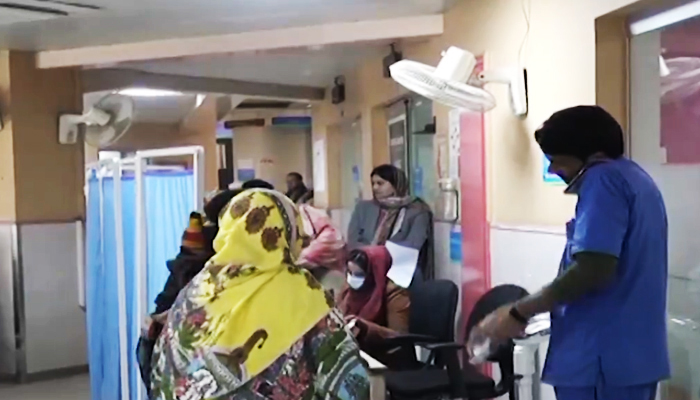Rise in pneumonia cases sets off alarm bells in Lahore
Health experts warn of an acute rise in pneumonia cases among elderly people and children for having weak immunity
LAHORE: The rising number of pneumonia patients in Lahore raised alarm bells among health officials and local administration.
The provincial health officials confirmed a spike in pneumonia cases with the arrival of winter in the provincial capital that is already coping with the smog challenge.
Punjab Public Health Reference Lab Head Dr Husnain Javed said that viral and bacterial pneumonia cases were continuously rising due to smog, dry and cold weather.
He added that an overwhelming number of pneumonia patients were heading towards emergency and out-patient departments (OPDs) at the hospitals.
He pointed out that people with weak immunity due to chronic cardiac, kidney and liver diseases or diabetes could easily contract the respiratory disease in cold weather.
He said that the major cause of increased cases was undiagnosed influenza and COVID-19 cases. Dr Javed urged citizens to immediately consult doctors and receive treatment after having respiratory issues.
He added not only in Pakistan, influenza and COVID-19 cases were also increasing across the globe after the arrival of the winter season which was the mutation of pneumonia.
Interim Minister for Primary and Secondary Healthcare and Population Welfare Dr Jamal Nasir told Geo News that smog was an additional factor for the increased respiratory diseases. He confirmed that the number of pneumonia cases was higher than the previous year.
Health experts also warned of an acute rise in pneumonia cases among elderly people and children. They suggested plenty of rest, warm beverages, steam baths or the use of humidifiers in houses for air moisture and timely consultations with doctors.
Pakistan is amongst 13 countries across the globe where pneumonia spreads every year
-
Can brain stimulation make people kinder & less selfish? New study offers hope
-
Mariah Carey details 'hardest' bipolar disorder experience
-
Pink reveals health routine for asthma management
-
Gigi Hadid talks about 'relieving tension' amid having Hashimoto's disease
-
Selena Gomez explains why she thought lupus was 'life-or-death'
-
How Kim Kardashian made her psoriasis ‘almost’ disappear
-
Nick Jonas gets candid about his type 1 diabetes diagnosis
-
Sir Jackie Stewart’s son advocates for dementia patients












